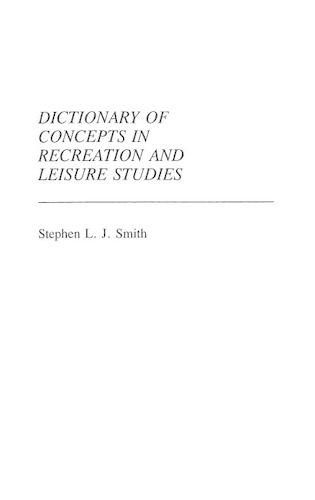
Dictionary of Concepts in Recreation and Leisure Studies
(Hardback)
Publishing Details
Dictionary of Concepts in Recreation and Leisure Studies
By (Author) Stephen L. Smith
Bloomsbury Publishing PLC
Greenwood Press
21st August 1990
United States
Classifications
Tertiary Education
Non Fiction
Hospitality and service industries
790.03
Physical Properties
Hardback
384
Description
The obvious audience for this book is professionals, scholars, and students in the recreation field. However, many of these entries relate to other fields of interest. . . . [T]his work should find a place in academic libraries supporting curricula in recreation and related leisure studies. Reference Books Bulletin The vocabulary and major concepts of the new field of recreation and leisure studies are just developing and this dictionary is the first major attempt to describe and systematize those concepts. Although university departments devoted to the study of recreation and leisure have been in existence for over half a century, there has never been a comprehensive dictionary written for the field. The concepts included in the dictionary may be grouped into four general categories. The first of these include elemental concepts--those ideas that form the intellectual bedrock of the field. Then there are theoretical concepts- scholarly models or interpretations of the patterns and processes seen in recreation and leisure. Research and methodological concepts make up the third category. while the fourth include professional concepts representing some of the basic ideas inherent in the service side of the field. Each definition is organized chronologically, emphasizing the evolution of the term and its interpretation or application. Definitions also point to links between concepts listed in the dictionary. Numerous references and suggestions for further reading are included for readers wishing to pursue a topic in more detail. Faculty and graduate students in recreation and leisure studies will welcome this first comprehensive dictionary of the field, as will the libraries of universities and colleges with a recreation and leisure studies department. The historical material and the critical review of conflicting definitions is a special feature and one that makes this book not only useful as a dictionary, but also as a reference work on state of the art ideas and concepts in the field.
Reviews
The obvious audience for this book is professionals, scholars, and students in the recreation field. However, many of these entries relate to other fields of interest. Environmentalists, for example, would be interested in such topics as conservation, environment, and national park. Those in the travel industry would find the entry gravity model extremely interesting; it is an analysis of vacation trip frequency expectation, based on a model analogous to Newton's Law of Gravitation. For these reasons, this work should find a place in academic libraries supporting curricula in recreation and related leisure studies.-Booklist
The real value of this book is not as a dictionary in the usual sense, in spite of its title. Rather, it is a primer that will serve both the beginner and the serious student as an introduction to major concepts in the field of recreation and leisure studies. Each of the approximately 100 entries, which are arranged alphabetically, contains four sections, the first of which is a brief definition of that concept's current usages, followed by the concept's origins in the context of the discipline. The third section of each entry contains citations for references used in the preceding section, and the fourth part lists sources of additional information. Entries range from elemental concepts--'fun, ' 'leisure'--through theoretical, methodological, and professional concepts, such as 'advocacy' and 'community development.' This book is a very worthwhile addition to the literature, since there is currently no other book that adequately addresses its subject. It would be valuable for any serious collection on recreation and leisure studies at the undergraduate or graduate level.-Choice
"The obvious audience for this book is professionals, scholars, and students in the recreation field. However, many of these entries relate to other fields of interest. Environmentalists, for example, would be interested in such topics as conservation, environment, and national park. Those in the travel industry would find the entry gravity model extremely interesting; it is an analysis of vacation trip frequency expectation, based on a model analogous to Newton's Law of Gravitation. For these reasons, this work should find a place in academic libraries supporting curricula in recreation and related leisure studies."-Booklist
"The real value of this book is not as a dictionary in the usual sense, in spite of its title. Rather, it is a primer that will serve both the beginner and the serious student as an introduction to major concepts in the field of recreation and leisure studies. Each of the approximately 100 entries, which are arranged alphabetically, contains four sections, the first of which is a brief definition of that concept's current usages, followed by the concept's origins in the context of the discipline. The third section of each entry contains citations for references used in the preceding section, and the fourth part lists sources of additional information. Entries range from elemental concepts--'fun, ' 'leisure'--through theoretical, methodological, and professional concepts, such as 'advocacy' and 'community development.' This book is a very worthwhile addition to the literature, since there is currently no other book that adequately addresses its subject. It would be valuable for any serious collection on recreation and leisure studies at the undergraduate or graduate level."-Choice
Author Bio
STEPHEN L.J. SMITH is Professor and Chairman of the Department of Recreation and Leisure Studies at the University of Waterloo, Canada. He is the author of Recreation Geography, Tourism Analysis, and has written numerous articles and technical reports for journals such as Leisure Sciences, Journal of Leisure Research, and Annals of Tourism Research.
